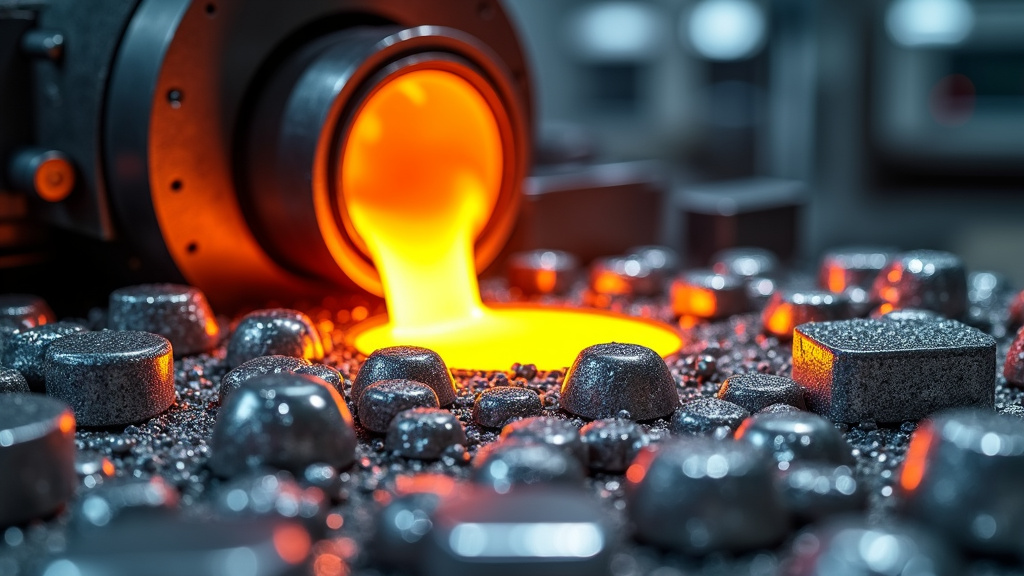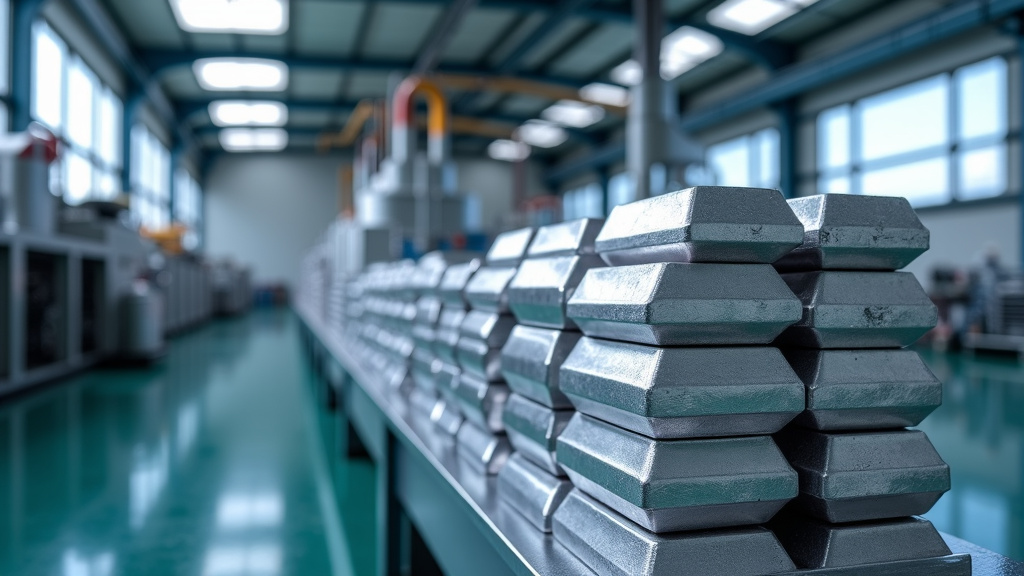5901 Botham Jean Blvd, Dallas, TX 75215
Is Aluminum Magnetic?
February 12, 2025Have you ever wondered: is aluminum magnetic? It’s a fascinating question that uncovers the unique properties of aluminum—and why it’s a crucial material in various industries.
At first glance, you might expect aluminum to behave like iron or nickel when exposed to a magnet. But here’s the surprising truth: pure aluminum is not magnetic in the traditional sense. It won’t stick to your fridge or be attracted to a strong magnet.
Why? It all comes down to atomic structure. Aluminum is paramagnetic, meaning it has a weak, temporary attraction to magnetic fields—but not strong enough to create a lasting effect. When exposed to a magnet, its unpaired electrons briefly align, causing a slight pull. However, once the magnet is removed, aluminum quickly returns to its non-magnetic state.
Interestingly, while pure aluminum isn’t magnetic, some aluminum alloys—those mixed with iron or other magnetic metals—can exhibit magnetic properties. This makes aluminum an essential material in industries where magnetic interference must be avoided, such as aerospace, electronics, and medical equipment.
At Okon Recycling, we specialize in recovering and repurposing aluminum from industrial and consumer waste, ensuring these valuable materials stay in circulation rather than ending up in landfills. Understanding aluminum’s properties helps businesses optimize material use and improve recycling efficiency.
In this article, we’ll explore the science behind aluminum’s magnetism, how alloys change its behavior, and why these properties make aluminum an irreplaceable material in modern industries.
Aluminum’s Magnetic Properties and Their Applications

Aluminum, a versatile metal used across various industries, has unique magnetic properties distinct from ferromagnetic materials like iron or nickel. Unlike these metals, aluminum is not magnetic in the traditional sense. It exhibits paramagnetic behavior, meaning it experiences a weak, temporary attraction to magnetic fields without retaining any magnetism once the field is removed.
This non-magnetic nature makes aluminum invaluable in applications where magnetic interference could pose significant problems. Industries such as electronics and aerospace heavily rely on aluminum’s properties to enhance product performance and reliability.
In electronics, aluminum’s non-magnetic characteristics are crucial. Electrical transmission lines often utilize aluminum because its non-magnetic nature prevents disruptions from electromagnetic interference, ensuring smooth electricity flow without unwanted interactions.
Aerospace Applications
The aerospace industry particularly benefits from aluminum’s non-magnetic properties. Aircraft and spacecraft designers prioritize materials that won’t interfere with sensitive navigation equipment or onboard electronics. Aluminum’s lightweight nature, coupled with its resistance to magnetic fields, makes it an ideal choice for constructing various components in these high-tech vehicles.
From the fuselage to internal structures, aluminum alloys play a crucial role in modern aircraft design. These materials contribute to fuel efficiency while ensuring that the plane’s electronic systems function without magnetic interference. Similarly, satellites and space stations rely heavily on aluminum to maintain their delicate balance in the harsh environment of outer space.
Everyday Applications
Beyond these high-tech applications, aluminum’s non-magnetic properties find use in everyday items. Consider your smartphone or laptop – the sleek aluminum casing not only looks stylish but also serves a practical purpose. It shields the internal components from external magnetic fields, ensuring your device operates smoothly.
Kitchen appliances, like refrigerators and microwave ovens, often incorporate aluminum in their construction. Here, the metal’s non-magnetic nature helps prevent interference with the appliance’s electrical components, contributing to their reliability and longevity.
Corrosion Resistance: An Added Bonus
While aluminum’s non-magnetic properties take center stage in many applications, its resistance to corrosion adds another layer of value. This characteristic makes aluminum particularly suitable for use in harsh environments, such as marine applications or outdoor electronic enclosures.
The combination of being non-magnetic and corrosion-resistant allows aluminum to maintain its integrity and performance over extended periods, even when exposed to challenging conditions. This durability factor significantly contributes to the metal’s popularity across various industries.
| Industry | Application |
| Construction | Window frames, roofing, cladding |
| Aerospace | Fuselage, internal structures |
| Automotive | Car bodies, engine components |
| Electronics | Smartphone casings, electrical cables |
| Packaging | Beverage cans, food containers |
| Renewable Energy | Solar panels, wind turbines |
Aluminum Alloys: When Aluminum Shows Magnetism

Pure aluminum, known for its lightweight and non-magnetic properties, takes on a fascinating twist when combined with certain metals. This transformation occurs in aluminum alloys, where adding elements like iron or nickel can introduce magnetic properties to the typically non-magnetic aluminum.
While pure aluminum is paramagnetic, meaning it is only weakly attracted to magnetic fields, the introduction of ferromagnetic elements can significantly alter its behavior. This change in magnetic properties opens up possibilities for specialized applications across various industries.
The Role of Iron in Aluminum Alloys
Iron, a strongly magnetic element, can have a profound effect on aluminum’s magnetic properties when added to form an alloy. Even small amounts of iron can introduce ferromagnetic characteristics to the aluminum alloy. This phenomenon is particularly interesting in the context of recycling and sustainability.
In the recycling process, the presence of iron contaminants in aluminum scrap can significantly impact the magnetic properties of the recycled material. This makes magnetic separation techniques crucial in sorting and purifying recycled aluminum to maintain desired properties for various applications.
The aluminum-iron alloy’s magnetic response varies depending on the iron content. Higher iron concentrations generally lead to stronger magnetic properties, allowing for fine-tuning of the alloy’s characteristics for specific uses.
Nickel’s Influence on Aluminum Magnetism
Nickel, another ferromagnetic element, can also induce magnetic properties when alloyed with aluminum. The addition of nickel to aluminum creates alloys with unique combinations of strength, corrosion resistance, and magnetic responsiveness.
These nickel-aluminum alloys find applications in industries where both structural integrity and specific magnetic properties are required. For example, they are used in aerospace components, where lightweight materials with controlled magnetic signatures are essential.
The ratio of nickel to aluminum in the alloy can be adjusted to achieve desired magnetic characteristics. This flexibility allows manufacturers to create materials tailored to specific industrial needs, balancing magnetic properties with other important factors like weight and durability.
Applications of Magnetic Aluminum Alloys
The ability to create aluminum alloys with magnetic properties has opened up new avenues in various fields. In the electronics industry, these alloys are used in electromagnetic shielding applications, where they provide both lightweight construction and magnetic interference protection.
Meanwhile, in the automotive sector, magnetic aluminum alloys contribute to the development of lighter, more fuel-efficient vehicles without compromising the magnetic properties required for certain components like sensors and actuators.
In renewable energy, these alloys play a role in the construction of efficient wind turbines. The combination of lightweight properties and controlled magnetic characteristics makes them ideal for certain turbine components, contributing to overall energy efficiency.
Comparing Magnetic Aluminum Alloys to Other Metals
Compared to traditional magnetic metals like pure iron or steel, magnetic aluminum alloys offer a unique balance of properties. They are generally lighter, which is a significant advantage in weight-sensitive applications. However, their magnetic strength is typically not as high as that of pure ferromagnetic metals.
This trade-off between weight and magnetic strength makes magnetic aluminum alloys particularly suitable for applications where a moderate magnetic response is needed in a lightweight material. It’s this versatility that continues to drive research and development in the field of aluminum alloy engineering.
As we continue to push the boundaries of material science, the story of aluminum alloys reminds us that even well-known materials can surprise us with new properties when combined innovatively. The ability to fine-tune the magnetic properties of aluminum through alloying opens up exciting possibilities for future technological advancements in recycling, manufacturing, and sustainable engineering.
| Alloy Composition | Iron Concentration (%) | Nickel Concentration (%) | Magnetic Properties |
| Aluminum-Iron Alloy | Varies | – | Magnetic properties increase with iron concentration |
| Aluminum-Nickel Alloy | – | Varies | Controlled magnetic response; used in aerospace components |
Exploring Future Possibilities in Aluminum’s Magnetic Properties

Aluminum, a ubiquitous metal in our daily lives, might soon transform magnetic technology. Scientists are exploring the atomic structure of this versatile material to unlock its hidden magnetic potential. This groundbreaking research could reshape industries ranging from renewable energy to transportation.
The core of this exploration involves manipulating electron arrangements within aluminum atoms. Traditionally, aluminum has been seen as non-magnetic due to its electron configuration. However, researchers are now investigating ways to alter these arrangements, potentially giving aluminum enhanced magnetic properties.
The implications of success in this field are significant. Magnetic materials are crucial for advancing technology. If scientists enhance aluminum’s magnetic features, it could lead to a new approach to magnetic technology.
Transforming Motors and Generators
One exciting prospect is the potential impact on motors and generators. These devices, essential in numerous applications, could become more efficient with magnetically enhanced aluminum. Imagine electric vehicles with motors that are not only lighter but also more powerful and energy-efficient.
The use of aluminum in these applications could reduce reliance on rare earth elements, currently essential for many high-performance magnets. This shift could have profound implications for the sustainability and cost-effectiveness of various technologies.
Moreover, generators in renewable energy systems, such as wind turbines, could benefit greatly from this innovation. More efficient generators could lead to increased energy production, making renewable sources even more competitive with traditional fossil fuels.
Beyond Motors: Expanding Possibilities
The potential applications of magnetically enhanced aluminum extend beyond motors and generators. In electronics, this technology could lead to more compact and efficient devices. From smartphones to supercomputers, the impact could be transformative.
In medical technology, enhanced aluminum could improve imaging devices like MRI machines. More powerful and precise magnetic fields could result in clearer images and more accurate diagnoses, potentially saving lives.
The aerospace industry, always seeking lighter and stronger materials, could find a game-changer in magnetically enhanced aluminum. This could lead to more fuel-efficient aircraft and advancements in space exploration technology.
Conclusion: Aluminum in Modern Technology and Recycling

While pure aluminum isn’t magnetic, its potential in alloy form and advanced applications is remarkable. From electric vehicles to renewable energy infrastructure, aluminum plays a crucial role in building a sustainable future.
One of aluminum’s greatest strengths is its infinite recyclability. Unlike many materials, aluminum can be recycled indefinitely without losing its properties, making it a cornerstone of the circular economy. Recycling aluminum conserves natural resources, reduces energy consumption, and cuts carbon emissions, making it an essential solution for industrial sustainability.
At Okon Recycling, we are committed to maximizing aluminum’s sustainable potential. Through advanced sorting technologies and closed-loop recycling systems, we help businesses reduce waste, lower environmental impact, and recover valuable materials efficiently.
The future of aluminum recycling is filled with exciting innovations—from new high-performance alloys to enhanced recovery methods. As industries and consumers become more environmentally conscious, the demand for sustainable aluminum solutions will only grow.
While aluminum may not attract magnets, it certainly attracts attention for its sustainability and versatility. By prioritizing responsible recycling and innovative applications, we can ensure aluminum continues to shape a greener, more efficient world.
For expert aluminum recycling solutions, contact Okon Recycling at 214-736-9509. Together, let’s transform waste into opportunity and build a more sustainable future.
